Introduction:
Technical SEO forms the backbone of any successful digital marketing strategy, laying the groundwork for improved search engine visibility and user experience. In this comprehensive guide, we’ll explore the intricacies of technical SEO, from understanding its fundamental principles to implementing advanced strategies for optimizing website architecture, improving site speed, and ensuring mobile-friendliness.
Understanding the Technical Side of SEO
Technical SEO encompasses a range of technical elements that impact how search engines crawl, index, and rank your website. From optimizing HTML tags to implementing structured data markup and managing XML sitemaps, this cluster demystifies the technical aspects of SEO, empowering you to make informed decisions to enhance your site’s performance.
Structuring URLs for SEO
URL structure plays a crucial role in search engine optimization, influencing both user experience and search engine crawlers’ ability to understand your site’s content. Dive into best practices for crafting SEO-friendly URLs, including the use of descriptive keywords, avoiding excessive parameters, and implementing proper redirects to maintain link equity and prevent crawl errors.
Importance of Site Speed for SEO
In today’s fast-paced digital landscape, site speed is more critical than ever for both user satisfaction and search engine rankings. Explore the impact of page load times on SEO performance and discover actionable strategies for improving site speed, such as optimizing images, minifying CSS and JavaScript files, leveraging browser caching, and utilizing content delivery networks (CDNs) to deliver content quickly to users worldwide.
Mobile-Friendliness and Technical SEO
With mobile devices accounting for an increasing share of internet traffic, ensuring mobile-friendliness is essential for SEO success. Learn how to create responsive web designs that adapt seamlessly to various screen sizes and devices, optimize mobile page speed, and implement mobile-specific features like Accelerated Mobile Pages (AMP) to provide a superior user experience and boost your site’s search engine rankings.
Tips for Optimizing Website Architecture for SEO
A well-structured website architecture not only enhances user navigation but also facilitates search engine crawling and indexing. This cluster offers practical tips for organizing your site’s content hierarchy, implementing internal linking strategies to distribute PageRank effectively, and creating XML sitemaps to guide search engines through your site’s pages efficiently. By optimizing your website’s architecture, you can improve crawlability, indexation, and ultimately, your site’s visibility in search engine results pages (SERPs).
Conclusion:
Technical SEO forms the foundation upon which your website’s search engine visibility and user experience are built. By mastering the technical aspects of SEO, including URL structuring, site speed optimization, mobile-friendliness, and website architecture, you can ensure that your site not only ranks well in search engine results but also provides a seamless and satisfying experience for your visitors across all devices. Implement the strategies outlined in this guide, and watch as your website climbs the ranks and attracts more organic traffic than ever before.





